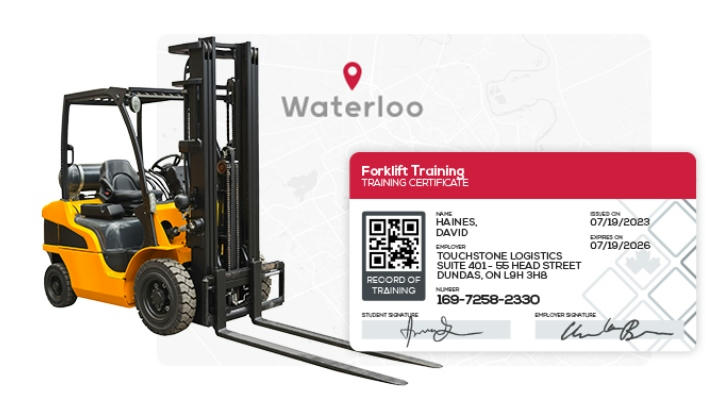From Training to Certification: Building a Successful Forklift Career
Forklifts are critical tools in industries such as manufacturing, warehousing, construction, and logistics. Operating a forklift requires specialized skills to ensure safety, efficiency, and compliance with regulations. Forklift training courses are designed to provide individuals with the knowledge and practical expertise needed to operate these machines effectively. This article explores the scope of forklift training, employment prospects for certified operators, sample test questions, and tips to achieve a score of 85 or above on certification exams.

Scope of Application of Forklift Training
Forklift training courses are essential for anyone operating or planning to operate a forklift. These courses are applicable across a wide range of industries, including:
Warehousing and Logistics: Forklifts are used to load, unload, and transport goods in warehouses. Proper training ensures safe handling of materials and reduces the risk of accidents.
Manufacturing: Forklifts move raw materials, finished products, and equipment within manufacturing plants. Trained operators can navigate tight spaces and handle heavy loads with precision.
Construction: On construction sites, forklifts transport materials and equipment. Training ensures operators can safely maneuver in challenging environments like uneven terrain.
Retail and Distribution: Large retail stores and distribution centers rely on forklifts to manage inventory and move products efficiently.
Agriculture: Forklifts are used to handle heavy loads like hay bales, feed, and equipment. Training ensures safe operation in outdoor and unpredictable conditions.
Forklift training is not limited to operators; it also benefits supervisors, safety officers, and employers who want to maintain a safe and compliant workplace.

Employment Prospects for Certified Forklift Operators
Certified forklift operators are in high demand across industries. Here are some key employment prospects:
Job Security: Forklift operators are essential to the smooth operation of businesses that rely on material handling. This demand ensures steady job opportunities.
Competitive Salaries: Certified operators often earn higher wages due to their specialized skills and safety knowledge.
Career Advancement: With experience, forklift operators can move into supervisory roles, logistics management, or training positions.
Diverse Industries: Certification opens doors to work in various sectors, from warehousing to agriculture, providing flexibility and career growth.
Global Opportunities: Forklift operation skills are in demand worldwide, offering opportunities to work in countries with thriving industrial and logistics sectors.
Certification not only enhances employability but also demonstrates a commitment to safety and professionalism, making candidates more attractive to employers.
Sample Test Questions for Forklift Certification
Forklift certification exams typically include multiple-choice, true/false, and practical scenario questions. Below are examples of the types of questions you may encounter:
1. Multiple Choice Questions
a. What is the primary purpose of a forklift's load capacity plate?
i. To display the forklift's serial number
ii. To indicate the maximum weight the forklift can safely lift
iii. To show the forklift's fuel consumption rate
iv. To list the forklift's maintenance schedule
b. When should you perform a pre-operational inspection on a forklift?
i. Only when the forklift is new
ii. At the beginning of each shift
iii. Once a month
iv. Only when the forklift is not functioning properly
2. True or False Questions
a. It is acceptable to carry passengers on a forklift if they are seated securely.
- True / False
b. Forklifts should always be driven at maximum speed to ensure efficiency.
- True / False
3. Practical Scenario Questions
a. You are operating a forklift in a busy warehouse. As you approach an intersection, you notice another forklift coming from the opposite direction. What should you do?
i. Speed up to cross the intersection quickly
ii. Slow down and sound the horn to alert the other operator
iii. Stop and wait for the other forklift to pass
iv. Reverse and find an alternate route
b. You are lifting a pallet that is close to the forklift's maximum load capacity. What precautions should you take?
i. Lift the load as quickly as possible to minimize strain on the forklift
ii. Tilt the mast forward to stabilize the load
iii. Ensure the load is balanced and secure before lifting
iv. Ignore the load capacity plate and proceed with caution

Achieving a Score of 85 or Above
To achieve a score of 85 or above on your forklift certification exam, follow these tips:
Study the Manual: Thoroughly review the forklift operator manual provided during training. Focus on key topics like load capacity, safety procedures, and pre-operational inspections.
Attend All Training Sessions: Participate actively in both theoretical and practical training sessions. Hands-on experience is crucial for understanding real-world scenarios.
Practice Regularly: Spend time practicing forklift operation under the guidance of a certified instructor. Familiarize yourself with different types of forklifts and their controls.
Take Practice Tests: Use sample questions to test your knowledge and identify areas where you need improvement.
Focus on Safety: Safety is a major component of the exam. Understand OSHA regulations, proper load handling, and emergency procedures.
Ask Questions: Clarify any doubts with your instructor during training. A clear understanding of concepts will help you perform better on the exam.
Stay Calm During the Exam: Read each question carefully and avoid rushing. Practical exams require focus and precision, so take your time to demonstrate your skills.
Conclusion
Forklift training courses are essential for anyone looking to operate a forklift safely and efficiently. The scope of these courses spans multiple industries, offering diverse career opportunities. Certified forklift operators enjoy strong employment prospects, including job security, competitive salaries, and career advancement. By preparing thoroughly and focusing on safety, aspiring operators can achieve a score of 85 or above on their certification exams, paving the way for a successful and rewarding career in forklift operation.
Whether you're entering the workforce or seeking to enhance your skills, forklift training is a valuable investment in your professional future.
